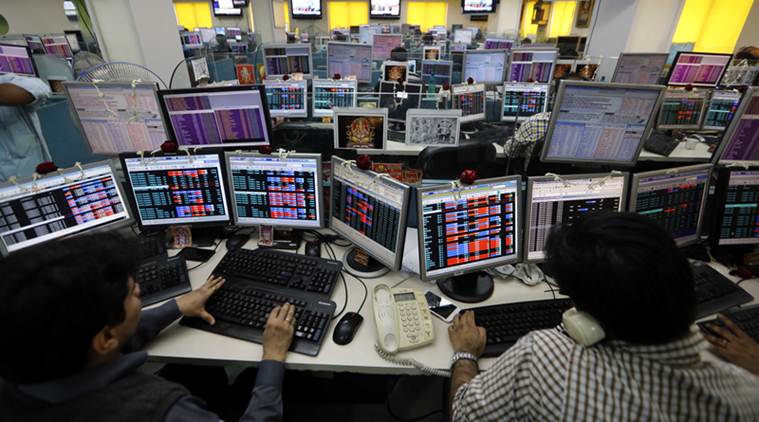While the fall in benchmark indices was broadly in line with other Asian peers, which slid on strong US jobs data, the central government’s move to tax share buybacks, raise tax on the super rich and hike minimum public shareholding in listed companies further disappointed domestic investors.
THE STOCK markets took a heavy beating Monday with the benchmark BSE Sensex plummeting 793 points, or two per cent, its biggest single-day loss in 2019 so far, as a combination of Union Budget proposals and a global selloff triggered a selling spree.
While the fall in benchmark indices was broadly in line with other Asian peers, which slid on strong US jobs data, the central government’s move to tax share buybacks, raise tax on the super rich and hike minimum public shareholding in listed companies further disappointed domestic investors.
The Sensex plunged 907 points in the intra-day trade before closing at 38,720.57 points with a loss of 792.82 points, taking the total loss to 1,188 points after the Budget presentation. The broader Nifty of the NSE tanked 252.55 points, or 2.14 per cent, to close at 11,558.60 points.
Opposition slams ‘dropped catch’, Government bats for $5-trillion economy
Global shares were in a muted mood Monday after strong US job gains tempered expectations that the Federal Reserve will deliver a large rate cut.
Tax moves add to slide
With the BSE Sensex tanking over 790 points, the benchmark index has lost over 1,100 points after Friday’s Budget. The government’s move to tax share buybacks and hike minimum public shareholding in listed companies are among the reasons that have impacted domestic investor sentiment.
Analysts said the government’s proposal to raise the tax burden on the ultra-rich could also affect foreign funds that are legally equivalent to Associations of Persons (AoP), a class of income earners required to pay more taxes after new liability slabs were created in the Budget. There were no immediate measures in the Budget that could kickstart consumption and related economic activities, they said.
With valuations not particularly cheap any more, all these factors weighed heavily on the market and precipitated a fall.
Investors’ wealth, or market capitalisation of listed companies, has fallen by over Rs 5.61 lakh crore after the presentation of the Budget Friday, when the Sensex dropped 395 points. On Monday, market capitalisation declined by Rs 3.39 lakh crore. The fall was across the board with the mid-cap index falling 1.99 per cent and small-cap index 2.46 per cent. All the sectoral indices ended in the red, with BSE capital goods, realty, auto, power, industrials, finance, bankex, oil and gas, utilities and metal index falling up to 3.78 per cent.
Pradeep Kesavan, Senior Vice President, Elara Capital, said the fall was due to a combination of global and domestic factors.
“Globally, a positive payroll expansion ahead of estimations has led to a fear of anticipated Fed rate cut not coming through. This fear of consequential impact on global flows has been felt across emerging markets. Domestically, proposals in the Budget to increase minimum public shareholding levels to 35 per cent was a dampener along with 20 per cent tax on share buy-backs,” he said.
“We also had more negative news in terms of cut in vehicle production announced by Maruti, deficit monsoons and reduction in area sown in Kharif crops, in an environment of continuing farm distress and weak demand for consumer products,” Kesavan said.
The selloff was partly on account of US job growth data, which showed a strong rebound in June. This is a dampener to expectations of aggressive rate cuts by the US Fed, which was being anticipated earlier. This had prompted a sell-off across Asia, with MSCI’s broadest index of Asia-Pacific shares outside Japan losing 1.4 per cent. The Shanghai Composite Index fell 2.6 per cent while Tokyo’s Nikkei 225 lost one per cent. Hong Kong’s Hang Seng retreated 1.5 per cent and Seoul’s Kospi declined 2.2 per cent.
According to Amar Ambani, President & Research Head, YES Securities, the hike in surcharge (super rich tax) in the Budget will have an adverse impact on high-end consumption, as well as reduce the investible surplus of high-income individuals, whose money was the mainstay of mutual funds, PMS and the midcap segment.
“The increased surcharge also has a bearing on foreign investors coming in through the Trust route and taxation of Cat-3 AIFs. This potentially reduces the post-tax attractiveness of India, vis-à-vis other markets, where such a high rate doesn’t exist,” he said.
There were fears around the squeeze in secondary market liquidity due to proposed higher public shareholding norms. “Fiscal push (in the Budget) to aggregate demand is missing. We believe, given weak demand and anaemic sentiments in the domestic private sector and lingering sluggishness in exports, that there is a need to expand fiscal deficit to keep up aggregate demand. Now, the monetary policy will have to do the heavy lifting on the growth front. Therefore, we believe the RBI will have to be more aggressive in rate cuts or liquidity support. And, the US Fed’s rate cycle is turning down, which provides the enabling environment for the same,” Kapil Gupta, Economist, Edelweiss Research, said.
According to analysts, the markets are expecting a clarification from the government on the applicability of super rich tax on foreign investors. “While we need to await SEBI regulations regarding how much time will be given to these companies to meet minimum public shareholding norms, the overhang of this requirement can have significant impact on the markets and specific stocks,” said Jagannadham Thunuguntla, Head of Research (Wealth), Centrum Broking.
As many as 1,174 companies out of over 4,700 listed companies will have to sell shares to reduce the public holding to 65 per cent. At the current market prices, the total quantum of sale that needs to be done by these 1,174 companies works out to Rs 3,87,000 crore. This will include the Indian arms of multinational companies and IT companies.
Source: Read Full Article


